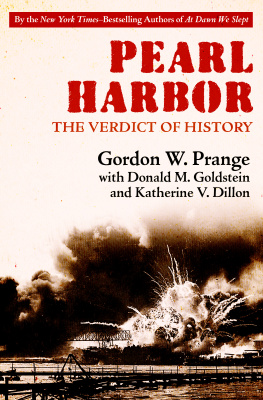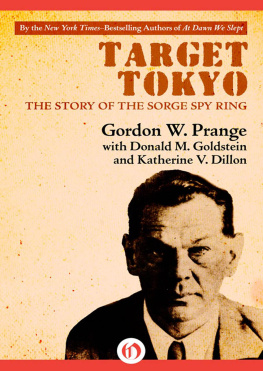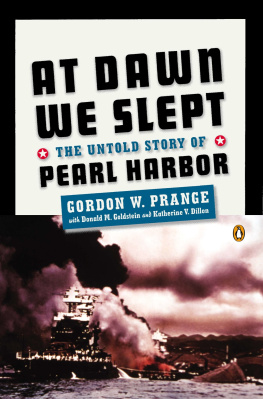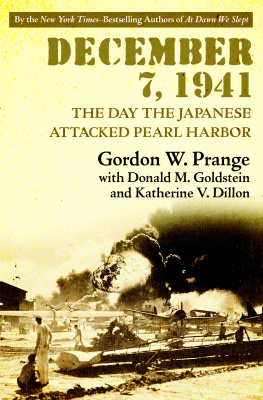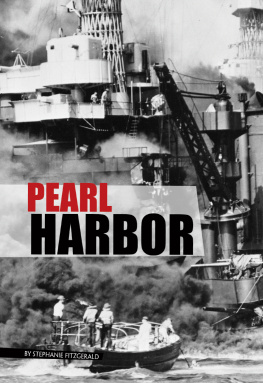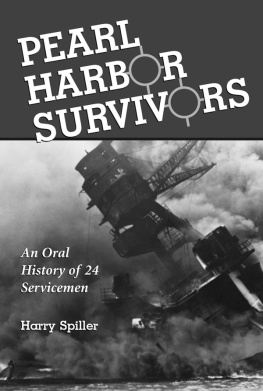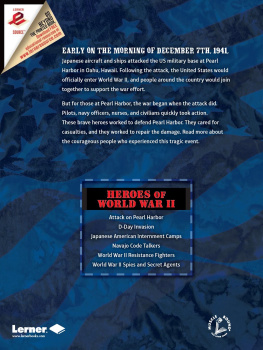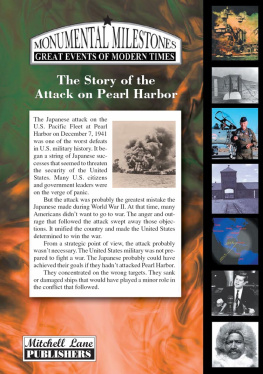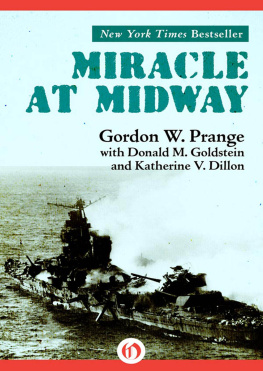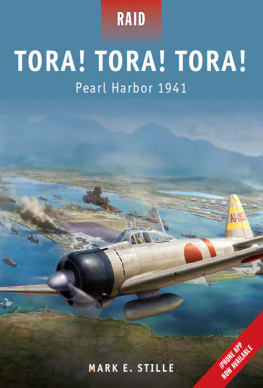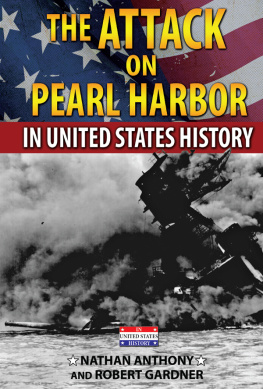Pearl Harbor
The Verdict of History
Gordon W. Prange with Donald M. Goldstein and Katherine V. Dillon

CHAPTER 1
We Were All Out There
Were the American people primarily responsible?The role of the pressPost-World War I disillusionmentMerchants of DeathReluctance to increase armed forcesAssurance of U.S. safetyPostevent press chargesIsolationism
Almost before the echoes of Japanese engines had died away, some individuals in the United States declared that the American people must accept a portion of the blame for Pearl Harbor, because of our blindness, our provincialism, our complacency, even our ignorance as a people.
Was this a valid judgment? Did Trumans remark spring from a profound search for the root of the matter, or had he spread the responsibility so thinly that no one could carry more than a token share?
Certainly, responsibility for the American aspects of what happened on December 7, 1941, was too widely diffused to pin exclusively on any one man, or even any two men. Newspaper editor William Allen White warned against passing the
This admission made White a rare bird among journalists. Yet the American press had been the prime medium of popularizing and perpetuating myths of Japanese inferiority, of American superiority, of the countrys security from Axis attack. For example, an editorial in the Chicago Tribune on Navy Day, 1941, ridiculed the idea of war with Japan:
She cannot attack us. That is a military impossibility. Even our base at Hawaii is beyond the effective striking power of her Fleet. She may threaten the Philippines but the Philippines are of so little vital interest to this country that we have already arranged to give them their independence within five years.
And what has Japan that we want? Nothing.
Thus the Tribune bestowed its prestige upon two dangerous fallacies: First, the United States held in its own hands the choice of peace or war; second, Hawaii was out of reach of the Japanese Navy. Moreover, the Tribune callously suggested that the United States should toss the Philippines to the wolves because its vital interests were not directly involved, although in 1941 those islands were under American protection.
Possibly the Honolulu Advertiser tacitly included the press when it admitted that the errors in judgment involved at Pearl Harbor belonged to all America, and, thus all America must share in the national complacency that found us unprepared.
The reasoning of those who blamed the people split into two streams. The first took an almost mystical attitude of mea culpa. The people of the United States had sinned, so the Lord punished them with Japanese bombs and torpedoes as the modern equivalent of fire and brimstone. Henry R. Luce spoke for this school of thought: The disaster was a sign of all the weakness and wrongness of American life in recent years. Following publication of the report of the tragedy that Secretary of the Navy Frank Knox made shortly after the event, the blunt-penned Dorothy Thompson poured an avalanche of scorn over her countrymen:
And I will tell you where the ultimate responsibilities lies, for Hawaii and for everything else. It lies with us.
For a whole generation the American idea has been to get as much as it could for as little effort. For a whole generation the American motto has been, I guess its good enough.
I accuse us. I accuse the twentieth-century American. I accuse me.
Walter Lippmann carried this reasoning another decimal point or two: what happened at Pearl Harbor is the very pattern and image of the deadly illusions and the moral failings which have prevailed among us since the other war
Others took a more practical view of why the American people were culpable. The Meridian (Mississippi) Star crisply expressed this rationale: For years and years we refused to face facts and demand from our congressmen an army, navy and air corps big enough and strong enough to hold its own against all comers. The result? A nation that was unprepared.
The Charleston (West Virginia) Gazette attributed this torpor to the fact that some honestly thought we could build a wall of steel around ourselves and retire within it in complete safety, there to remain isolated until the storm passed.
This withdrawal did not result from a heartless disregard for the rest of humanity. No natural disaster could occur in so remote a corner that Americans would not reach into their hearts and pockets to help alleviate suffering. But to involve themselves again in the Old Worlds man-made holocausts was something else.
The United States had entered World War I in a spirit of high sacrifice. Uncle Sam and his noble allies would fight the war to end all wars, would make the world safe for democracy, a world fit for heroes to live in. After they came out of the ether, American survivors looked around and what did they see? In Germany an iron-fisted, sadistic regime which made Kaiser Bills huns look like Boy Scouts by comparison; Benito Mussolini, trying to remodel the genial Italians into scowling Roman warriors, had hooked them ignominiously to Adolf Hitlers tailboard; Russia was proving that if you scratched a commissar you drew Romanov blood; Japan had run amok.
Instead of war being at an end, the nations of Europe and Asia were arming to the back teeth; the world had never been less safe for democracy; it was not a suitable abode for everyday, peace-loving human beings, let alone heroes. An indignant public concluded that Uncle Sam had been played for a sucker.
Popular imagination seized upon merchants of death, a catch-phrase of the 1930s, publicized by a number of books on the manufacture and sale of armaments. This concept culminated in the Senate investigations of the munitions industry held between 1934 and 1936, presided over by Senator Gerald P. Nye of North Dakota. Nyes committee found:
While the evidence does not show that wars have been started solely because of the activities of munitions makers and their agents, it is also true that wars rarely have one single cause, and the committee finds it to be against the peace of the world for selfishly interested organizations to be left free to goad and frighten nations into military activity.
It was not a pretty picture that the Nye Committee held up to the eyes of a disgusted nation. Not the least disquieting aspect of the inquiry was the revelation of the close relationship between the armed forces and the munitions industry. Naturally, the Army and Navy wanted the United States to have a strong capacity to produce armament, but in some cases they went over the line. Perhaps most damaging from the standpoint of the American people, testimony concerning the munitions industrys publicity campaigns cast doubt upon the credibility of the press in crisis reporting. Nye remarked to a witness that he had noted over a period of nine years
that just preceding the advent of each naval appropriation bill we have had a great deal in the papers about trouble with Japan. How much of these annual scares are occasioned by what was strictly propaganda, having your own personal interests at stake? How many of
Yet the years of the Nye Committee1934 to 1936covered a period of acute need for close, objective reporting and a well-informed public. Japan had given notice that it would abandon the Washington Naval Treaty and had withdrawn from the second London Conference. Germany had repudiated the arms limitations sections of the Versailles Treaty, denounced the Locarno Pact, and sent troops into the Rhineland. All the iniquities of the arms trade could not nullify these iron facts.

